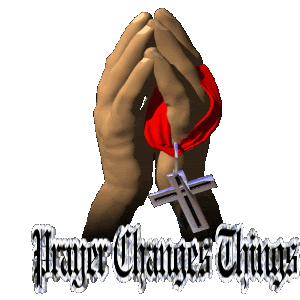Spreading God's Love Thru Prayer
Pew study looks at the religious landscape of African-Americans
T hrough slavery and segregation, the black church has provided hope, unity and sanctuary.
Today African-Americans are the nation’s most religious group. So says a recent study by the Pew Forum on Religion & Public Life.
“While the U.S. is generally considered a highly religious nation, African-Americans are markedly more religious on a variety of measures than the U.S. population as whole,” says the study’s overview.
Compared to the rest of the population, more African-Americans have a religious affiliation, attend worship, pray frequently and place greater importance on religion in their lives.
The data come from Pew’s U.S. Religious Landscape Survey, collected in 2007 and released last summer. Pew recently came out with a new analysis of African-Americans.
“Given the inauguration of (Barack) Obama, (Martin Luther) King Day and Black History Month, we thought it would be a good time to look at this subgroup,” Pew researcher Greg Smith said. “This new analysis helps people understand religion in the African-American community, which is a large group.”
The study is in line with other studies that have had similar results, said Lawrence Mamiya, religion and Africana studies professor at Vassar College in Poughkeepsie, N.Y.
Among the Pew findings:
•Eighty-seven percent of African-Americans say they belong to a particular religious group, compared to 83 percent among the total population.
•Seventy-nine percent say religion is “very important” in their lives, compared to 56 percent of the total population.
•Fifty-three percent say they attend religious services at least once a week, compared to 39 percent of the total population.
•Seventy-six percent say they pray at least on a daily basis, compared to 58 percent of the total population.
•Eighty-eight percent say they are absolutely certain that God exists, compared to 71 percent of the total population.
The religious portrait of African-Americans reveals that they are overwhelmingly Protestant (78 percent), with 59 percent belonging to historically black churches.
Only 12 percent of African-Americans are not affiliated with any particular religion; 5 percent are Catholic; 1 percent are Jehovah’s Witnesses; 1 percent are Muslim; 1 percent are atheist or agnostic; and small fractions are in other faiths.
“What I like about the study is that it indicates diversity in the African-American religious community,” said Anthony Pinn, humanities and religious studies professor at Rice University in Houston.
In reviewing the data for African-American women, Pew researchers concluded that “no group of men or women from any other racial or ethnic background exhibits comparably high levels of religious observance.”
According to the survey, 84 percent of African-American women say religion is very important to them, and 59 percent attend religious services at least once a week.
“Black women often say ‘my pastor’ or ‘my church,’ which denotes a sense of ownership and independence and trust, which they wouldn’t say about other institutions in American society, like they wouldn’t say ‘my Democratic party’ or even ‘my NAACP,’ ” Mamiya said.
Additional findings:
•Religious beliefs: In addition to the high belief in God, 55 percent interpret Scripture as the literal word of God compared to 33 percent of the overall population; 83 percent believe in angels and demons compared to 68 percent of the overall population; 84 percent believe in miracles compared to 79 percent of the overall population; and 58 percent are absolutely convinced there is life after death compared to 50 percent of the overall population.
•Religion and social issues: Forty-nine percent of African-Americans want to keep abortion legal in most or all cases, and 44 percent want it to be illegal. The study found that these figures are similar to the public as a whole, 51 percent to 42 percent. Regarding homosexuality, 41 percent of African-Americans say homosexuality should be accepted by society, and 46 percent say it should be discouraged, compared to 50 percent and 40 percent for the public overall.
•Religion and politics: 61 percent of African-Americans say houses of worship should express their views on social and political matters, compared to 45 percent of the total population. However, 58 percent say houses of worship should not come out in favor of political candidates, compared to 66 percent of the total population.
As for party affiliation, 76 percent of African-Americans describe themselves as Democrats while just 10 percent favor the Republicans. This compares with 47 percent and 35 percent for the total population, Democrats to Republicans.
“African-Americans are more religious because our existence has depended on believing on something greater than ourselves to get us through,” said F. Douglas Powe Jr., evangelism and black church studies professor at St. Paul School of Theology in Kansas City.
“Many of us were brought over as slaves, and our very existence was called into question, and it was faith that helped us to survive. The way that we made meaning out of life was through our faith, which eventually became expressed mainly through Christianity.
“That heritage has continued from generation to generation, even after slavery. And after slavery the experience with Jim Crowism and other forms of racism, the church and particularly the historically black church has always been the one place where we could express ourselves freely and to have a sense of somebodyness, that we were someone.”
The black church has been the predominant and independent institution in the black community, Mamiya said.
“Black churches were created and founded by the people themselves,” he said. “There is a sense of ownership and trust that I don’t think can be replicated in other communities.
“And they have continued to prove themselves to be effective purveyors of the concerns of African-Americans in society. African-Americans have seen that churches have been very effective in producing programs that meet not only their religious needs but also their economic and political concerns.”
Because of the role the black church has played in fighting slavery and struggling against racial segregation, when African-Americans embrace the black church, they are “staying committed and showing an alliance to an organization that has been historically committed to their overall health and well-being,” Pinn said.
“Many black Christians understand their embrace of the church as a life orientation,” he said. “So you don’t simply pray on Sunday. Prayer informs how you move through all seven days of the week.”
Analyzing the data of African-American social and political views is more complex.
The historically black church is morally conservative but socially progressive, Powe said.
“So what happens, if you just went by moral issues, such as abortion and homosexuality, many parishioners in African-American churches would line up more with the Republican Party,” he said.
“But with social issues, in terms of health care, jobs and education, many African-American parishioners line up more with the Democratic Party. But they vote overwhelmingly Democratic.”
As for politics, it has been a tradition in black communities for political candidates to come and speak in churches, and sometimes the pastor will express a preference, Mamiya said. “So I was surprised by the statistics that six in 10 say churches should refrain from endorsing political candidates.”
Pinn views it another way: “The black pastor may say, ‘This is our friend, Joe Smith.’ But when James Abraham comes, he says, ‘This is our friend, James Abraham.’ Because the pastor knows political connections can help the church.
“The pastor will encourage members to vote. But pastors know if they endorse a particular candidate that it may endanger their tax status.”
In regards to the younger generation, the study shows that African-Americans under the age of 30 do not have the same high level of commitment. And Powe said it is difficult from the study to determine if they believe in God and Jesus in the traditional way that the historical black church understands God.
“It does not mean that they are no longer interested in the black church,” Pinn said. “They might be getting assistance in different ways. For example, the hip-hop community might be offering answers to life’s questions that others find in the church.”
But Mamiya said other studies have pointed out that even among younger African-Americans, “they still tend to score higher in religious attendance than white groups.”
“There still is a high level of loyalty. Their faith is still very strong.”
--------------------------------------------------------------------------------
Views: 45
Comment
-
Comment by BrainySkeeta on February 21, 2009 at 6:20am
-
© 2026 Created by Guardian.
Powered by
![]()




 Guardians Prayer Warriors if you would like to go to our Facebook page please click the buttons. If you would like to open up a Guardians Prayer Warriors group on a different site please contact Guardians Ministry so that we may put the name of your site on the page and you can use Guardians Prayer Warrior tags.
Guardians Prayer Warriors if you would like to go to our Facebook page please click the buttons. If you would like to open up a Guardians Prayer Warriors group on a different site please contact Guardians Ministry so that we may put the name of your site on the page and you can use Guardians Prayer Warrior tags.







You need to be a member of Guardians Prayer Warriors to add comments!
Join Guardians Prayer Warriors